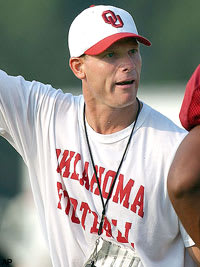Stoops DC Decision Benefited Both Orange Bowl Participants

After the 2011 college football season, Oklahoma and Clemson were both at a pivotal moment in their programs' history. It was a moment when both schools decided to endure temporary turmoil for future fruition. Clemson was coming off of a 70-33 beat-down at the hands of West Virginia in the Orange Bowl, while Oklahoma had plateaued through the Landry Jones era leaving both programs somewhat aimless as the year turned from 2011 to 2012. A decision to bring back Mike Stoops to Oklahoma by Bob Stoops would prove mutually beneficial in placing both programs back into the national spotlight just four years later.
It wasn't an easy decision for the Oklahoma head man. His brother was recently fired as the head coach at the University of Arizona and looking for some stability. The Oklahoma coach knew his defense needed a new voice, a pot-stirrer, something to mix-up the stagnated and stale pieces of complacency. He also knew that Brent Venables was, and is, one of the best defensive minds in college football and that he didn't want that asset just to walk out the door either. Stoops attempted the high-wire act of balancing the egos of two men to re-take the roles from years ago that catapulted them into their lofty status today. It was an appeal to nostalgia; a time when things were rolling in Sooner Nation, but it ultimately proved too utopian of an ambition.
While the place was the same, it was a different time in Norman, Oklahoma. Careers had been advanced, egos built, money made, and for Brent Venables that thirst for ambition had yet to be quenched like many of his colleagues before him. The addition of "co-" in front of your title where there was none before can make a man feel like he's becoming entrenched in one spot; demoted to a role of less importance. So, with a lucrative $800,000 salary in hand (now $1.35 million), Venables made the move to Clemson to carve out a legacy that was decidedly his own.
Meanwhile, in Norman, Mike Stoops took over a defense in a Big 12 that had changed drastically in his nine-year absence from the conference. Each year following his return, Stoops seemed to figure out how to stop one side of the ball, but not the other. In post-game interviews Mike would routinely say things like, "Well you can't stop all of it, you just have to try and shut down one phase." It wasn't the fiery, ambitious, gung-ho, passionate defensive coordinator that Sooner fans had remembered from the glory days of the early 2000s. It was a man who seemed unsure of how to handle his new situation, a man who was struggling to adapt, a man who was surprisingly honest and candid in his frustrations about ever being able to ever completely shut down these new offenses.
Mike Stoops has always been raw and emotional. It's part of what endeared him forever to so many Oklahoma fans watching him scream, yell, fidget, and freak out on the sidelines more than they were at home on the couch. He cared. He cared about Sooner football. He cared about the fans. He cared about the kids. He cared about the results. All those things still held true, except, Stoops had seemingly stopped caring about dominating. And from 2012-2014 it was like he had become a man accepting his new defensive role of merely containing offenses, rather than his defense inflicting its will.
Then 2015 happened. A new mentality swept through the 405 and Mike Stoops' aggressive, overwhelming, and tenacious defense emerged from the ashes like a phoenix; interception numbers went up, sack totals skyrocketed, and there were no embarrassing outputs of allowing 40+ points. It is the first regular season since 2007 when that was the case and if Oklahoma can continue the trend, it will be the first time the Sooners have completed a full season without allowing 40+ points since 2003 - the last year of Mike Stoops' first stint in Norman.
On their own, both men have eventually cultivated their own cultures of dominant defenses that have been crucial to their overall team success. As you can see, both coordinators encountered some initial problems when taking over their positions in 2012. Even though Venables rights the ship more quickly than does Stoops, both defenses have eventually transformed into much better units in nearly every category than where they were in 2011.
And now, all the characters will take the same stage again. This time to determine who gets to play for a national championship.
Remember, the 2012 season was the first with both coordinators at their new schools.





